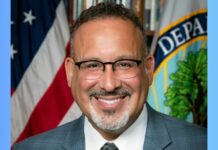
Photo by Chesnot/Getty Images
PARIS — Ahead of France’s elections this spring, Éric Zemmour could become the country’s first major Jewish presidential candidate in the post-war Fifth Republic era. Recent polls have him pulling 16 percent of the vote, placing him on equal footing with the top challengers to President Emmanuel Macron.
But there’s a catch: The far-right journalist, public intellectual and consistent provocateur Zemmour hasn’t announced that he is officially running yet.
And most of France’s Jews want nothing to do with him, for various reasons.
“He is a far-right politician, and as such a danger to the republic. He may be Jewish, but he is not the voice of the Jewish community,” said Joel Mergui, president of the Consistoire, a centrist French-Jewish organization.
Zemmour, 63, has cultivated a strong conservative following through a staunch nationalist and anti-immigrant philosophy that describes French society as under siege from Muslim and other foreign influence. Some of his language has even led to hate speech convictions and fines — in 2011, he called Muslim immigrants “invaders” and in 2016 said that most drug dealers are Arab or African.
Some of his critics say his own heritage belies a hypocrisy: His parents are Sephardic immigrants from Algeria.
Until now, French-Jewish leaders and organizations have not spent much energy responding to Zemmour’s rhetoric, but his sudden meteoric rise to the top tier of the election polls — despite the fact that he remains lukewarm on a political career in interviews just months before the vote — has forced them to take public stands on the would-be candidate. His approval ratings match those of Marine Le Pen, who received a third of the vote in the final round of the 2017 elections as leader of the similarly right-wing National Rally party.
‘Antisemite? Certainly’
During an interview for France 2, Rabbi Haim Korsia was asked whether Zemmour is an antisemite.
After first asking his interviewer whether Zemmour is Jewish, Korsia replied: “Antisemite? Certainly. A racist? Definitely.”
Tribune Juive, a mainstream French-Jewish paper with many conservative readers, on Oct. 28 published an editorial that harshly criticized Korsia for labeling Zemmour an antisemite and rejected the charge as unfounded. That same op-ed, however, called some of Zemmour’s statements “disconcerting,” “abject,” “obsessive” and “pathologically nationalistic.”
The French-Jewish opinion on Zemmour from across the political spectrum has been complicated in large part because of his views on a number of specifically Jewish issues.
Zemmour, who has published several best-selling books on politics and society, has spoken openly about his Jewish identity, saying that he goes to synagogue occasionally and wears a kippah in a house of worship. Nonetheless, he appears to support the idea of banning the donning of a kippah in public, along with other religious signs. In a debate in 2016, he compared wearing a kippah to a “religious selfie,” saying that having one on is to “impose one’s religion on others.” Asking Jews to wear them, he added, was akin to asking them to wear the yellow stars Nazis forced on them during the Holocaust.
Even more offensive to many French Jews is his defense of a controversial theory, according to which the Nazi-collaborationist Vichy government sacrificed foreign Jews living in France to save native French ones during the Holocaust. Accepted by some historians, it is hotly contested by others, who say the Vichy government also betrayed Jews with French citizenship.
“Vichy protected French Jews,” he said on CNews, a French Fox News equivalent.
Zemmour has also cast doubt on the innocence of Alfred Dreyfus, the French-Jewish army captain of German descent whose prosecution on specious espionage claims was widely condemned as antisemitic. On a television panel in 2020, Zemmour said that even if Dreyfus was innocent, he may have been targeted “for being German, not for being Jewish.”
Zemmour can even irk some of the far-right French Jews who would figure to be some of his biggest supporters. Last year, he said on CNews that if Israel has nuclear weapons, Iran should not be denied them.
The French Jewish Defense League, a far-right group, in a statement said that although it “welcomes regularly and defends Éric Zemmour’s courage against the Islamists,” his remarks on Iran show “ignorance or bad faith that discredit his assertions.”
These takes, along with his broader ideology, have turned the majority of the French Jewish establishment and prominent French Jewish figures against Zemmour.
“He’s not a useful idiot – he’s a useful Jew and the new leader of Holocaust denial in our country,” wrote Francis Kalifat, the head of the CRIF umbrella group of French-Jewish communities, in an op-ed that was reprinted across French media.
Famed Nazi hunter Serge Klarsfeld and his son Arno wrote earlier this year in an op-ed in the Le Monde newspaper that Zemmour “tramples national values as well as Jewish ones,” and declared that “Jews must fight the far-right.”
Bernard-Henri Levy, a well-known Jewish center-left philosopher, penned an op-ed in Le Point in which he drew parallels between Zemmour and former President Donald Trump, arguing both were inadequate choices for anyone who cares about Jewish values.
“Five years ago, I told American Jews tempted by Trumpism: Allying with it … could be suicidal. I now say the same to Jews in France tempted by the nefarious simplism of Éric Zemmour,” who denies “Jewish generosity, Jewish vulnerability, Jewish humanism and its foreignness,” Levy wrote.
Ethnic replacement
Like Trump, Zemmour has leaned into a narrative of fear driven by the concept of ethnic replacement.
“There is a danger our country will die, its population being replaced by another one, its civilization likewise replaced,” he said during an Oct. 1 interview, in which he highlighted — as Trump did during his campaign — the difference between himself and the career politicians facing him, such as Marine Le Pen and Emmanuel Macron, France’s centrist president, who is projected to win despite holding an approval rating lower than 40 percent.
Korsia’s interview about Zemmour generated controversy also around a far-left presidential candidate, Jean-Luc Melenchon.
Melenchon has a rich history of statements widely perceived as antisemitic. In an interview for BFMTV, Melenchon suggested both that he is not concerned about antisemitism and that Zemmour cannot be an antisemite because his politics are part of Jewish tradition.
“Zemmour isn’t necessarily antisemitic because he reproduces many cultural scenarios,” Melenchon said. “It’s all traditions tied to Judaism that, to its credit, have helped it survive through the ages.” Then he added that if Zemmour is antisemitic, “it’s really not my problem: Then he’ll be condemned for it. He’s a racist, that’s for sure.”
Following an outcry on social networks accusing Melenchon of a fresh expression of antisemitism, the far-left politician offered a rare retraction. “I am even willing to admit that I expressed myself poorly, because I opened up to interpretations that run contrary to what I wanted to say,” Melenchon wrote on Facebook.
Zemmour also has his share of Jewish supporters. The Tribune Juive, one of the community’s oldest publications, recently published a series of four op-eds by people who either support Zemmour or feel compelled to hit back against his Jewish establishment critics.
In one of the articles, William Fitoussi, a conservative insurance agent from Paris, called Zemmour the “only politician seeking to end the inflow of millions, including the murderers of their brethren from the community.”
CRIF and Levy’s “revisiting Éric Zemmour’s Jewish identity is so nauseating that I couldn’t believe it at first,” Elie Sasson, a Jewish dentist from the Paris area and columnist for the Tribune Juive wrote in an op-ed published Oct. 17. “They are signaling his excommunication because he’s not a ‘good leftist Jew.’”
Rodolphe Sebbah, a photographer from Paris, in another Tribune Juive op-ed, lambasted who he called the “VIPs on the left” like Levy, who admired former president François Mitterrand despite his personal friendship with the high-ranking Vichy official and Nazi collaborator René Bousquet.
Sarah Cattan wrote in the Tribune that Zemmour has “abject views that need debating, but not through his Jewish identity.”
Jean-Marie Le Pen — a notorious Holocaust denier and vocal antisemite who founded the National Rally party that his daughter now leads — is a firm supporter of Zemmour as well.
“The only difference between Éric and me, is that he’s Jewish,” the elder Le Pen told Le Monde in an interview published earlier this month. “It’s difficult to label him a Nazi or fascist. This gives him greater liberty.”
Commenting on this, Patrick Klugman, a Jewish Socialist Party lawmaker in Paris’ city council, said earlier this month on RCJ radio: “It is a historical fact that saddens me no end but that I cannot hide: The hero of the French far-right identifies as a Jewish person, and his Judaism is seducing the worst antisemites.”
Hundreds of antisemitic incidents, including many violent assaults, occur annually in France, most frequently in low-income neighborhoods where Jews and Muslims live in proximity. At east 12 Jews have been murdered over the past decade in antisemitic attacks by jihadist terrorists in France.
On the streets of Sarcelles, an impoverished suburb of Paris with many Jewish and many more Muslim residents, “no one is expecting, nor particularly interested in, Zemmour becoming the first Jewish president,” said Olivier Arafi, a local butcher, while dismembering a kosher chicken.
“Zemmour seems to me like a little man who likes to talk,” Arafi added. Like Zemmour, also Arafi’s parents came to France from Algeria.
“Still it’s good Zemmour came along. I think he may be opening the door to others, perhaps better qualified people, by showing them that France is ready for new voices from new places,” he said.





